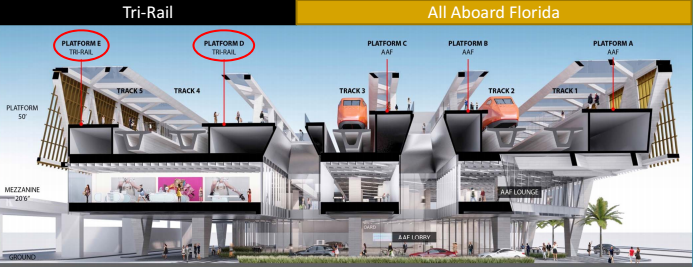
Opportunities like this don't come around very often. Traffic-clogged Miami is tantalizingly close to a commuter rail extension that would link its northern suburbs to the heart of downtown. But the city needs to secure $30 million in the next few months to make it happen.
The region has a commuter rail line called Tri-Rail that runs 72 miles north to south and serves about 15,000 weekday passengers. But the line heads inland in the city of Miami and terminates at the airport, not downtown. With the construction of All Aboard Florida, the private high-speed rail line between Miami and Orlando, Tri-Rail could add a new spur that takes commuters directly downtown.
The South Florida Regional Transit Authority says bringing Tri-Rail to downtown by piggybacking on All Aboard Florida -- an improvement that would conservatively add a few thousand daily passengers -- would not cost much. All it would take is $69 million to build two elevated boarding platforms at the downtown train station.
The Florida Department of Transportation has committed $17 million to the proposal. And SFRTA has pledged another $3 million. It's up to the county, city, and other partners to come up with the remaining $49 million.
"We’re looking at this as now or never," said Bonnie Arnold, a spokesperson for SFRTA. "This opportunity is not going to come around again. The opportunity to have commuter rail on elevated tracks is really critical because the traffic congestion in Miami has just gotten awful. It’s almost impassable."
Tri-Rail closely parallels congested I-95 in Miami. In fact, the impetus for the line in the 1980s was a construction project that closed part of that highway, with Tri-Rail using freight rail tracks to take pressure off the road system. Now, more than 25 years later, history could repeat itself: The Florida Department of Transportation recently announced that I-95 will be undergoing significant construction through 2022.
The project got a small shot in the arm last week, when the Miami City Council pledged $5.5 million. Mayor Tomás Regalado had threatened to veto any spending but has since backed down, and an additional $5.5 million may be coming from the city, according to Curbed. Miami-Dade County has promised $8 million, Curbed reports. The contribution from the Miami Community Redevelopment Association is still being negotiated.
One tough political question has been the proportion of funding that will come from the Overtown Community Redevelopment Authority, which could be as much as $28 million. The authority is funded by a special tax district whose revenue comes from an impoverished, African American neighborhood, and the fairness of making it responsible for such a large share of funding has been questioned. To return some of the benefits of the project to the neighborhood, one recent proposal would make Tri-Rail service free for local residents.
Irvans Augustin of Miami's non-profit Urban Impact Lab said it would be a shame if local political disagreements got in the way of adding such a critical transit link for the region.
"It’s the first step in terms of creating an actual transportation network," he said.





